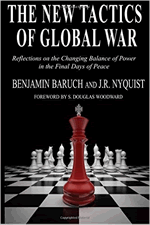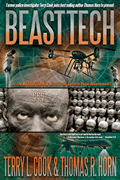CRUZ AND RUBIO ARE ELIGIBLE TO BE PRESIDENT
By
Dr. Ed Berry, PhD, Physics
December 17, 2015
NewsWithViews.com
The question of whether Ted Cruz and Marco Rubio are eligible to be president of the United States has been reviewed by several authors. The question comes down to the definition of a natural born citizen.
Cruz was born in Canada while his mother was a U.S. citizen and his father had been a resident of the United States. Rubio and Jindal were both born in the United States to parents who were not U.S. citizens.
As a physicist, I leave lawyering to the lawyers. I stick to reading and qualifying legal opinions. The logic of physics is very similar to the logic of law.
Below are my summaries of the three key legal opinions on this subject. Apuzzo argues for ineligible. Katyal, Clement, and Maskell rebut Apuzzo's opinion and argue for eligible.
I conclude Katyal, Clement, and Maskell easily win the debate, meaning both Cruz and Rubio are eligible to be president.
Mario Apuzzo - Cruz and Rubio are ineligible
Mario Apuzzo claims neither Cruz nor Rubio are eligible. He wrote on November 29, 2015:
Only those born in the United States to parents who were both U.S. citizens at the time of their birth are "natural born citizens."
Cruz can be a citizen of the United States at birth, but only by virtue of a naturalization Act of Congress (section 301(a)(7) of the Immigration and Nationality Act of 1952). He is not and cannot be a natural born citizen under the common law because, while he was born to a U.S. citizen mother, he was not born in the United States and he was born to a non-U.S. citizen father.
Rubio and Jindal were born in the United States to two non-U.S. citizen parents. They are both citizens of the United States at birth, but only by virtue of the Fourteenth Amendment. They are not and cannot be natural born citizens under the common law because, while they were born in the United States, they were born to two non-U.S. citizen parents.
However, Apuzzo did not address the following two legal reviews.
Neal Katyal and Paul Clement - Cruz and Rubio are eligible
Neal Katyal and Paul Clement, Professors of Law at Georgetown University, wrote a commentary in the Havard Law Review March 11, 2015, titled, "On the Meaning of 'Natural Born Citizen'.” They conclude,
All the sources routinely used to interpret the Constitution confirm that the phrase “natural born Citizen” has a specific meaning: namely, someone who was a U.S. citizen at birth with no need to go through a naturalization proceeding at some later time. And Congress has made equally clear from the time of the framing of the Constitution to the current day that, subject to certain residency requirements on the parents, someone born to a U.S. citizen parent generally becomes a U.S. citizen without regard to whether the birth takes place in Canada, the Canal Zone, or the continental United States.
The Supreme Court has long recognized that two particularly useful sources in understanding constitutional terms are British common law and enactments of the First Congress. Both confirm that the original meaning of the phrase “natural born Citizen” includes persons born abroad who are citizens from birth based on the citizenship of a parent.
The Naturalization Act of 1790 expanded the class of citizens at birth to include children born abroad of citizen mothers as long as the father had at least been resident in the United States at some point. But Congress eliminated that differential treatment of citizen mothers and fathers before any of the potential candidates in the current presidential election were born.
While the field of candidates for the next presidential election is still taking shape, at least one potential candidate, Senator Ted Cruz, was born in a Canadian hospital to a U.S. citizen mother. Despite the happenstance of a birth across the border, there is no question that Senator Cruz has been a citizen from birth and is thus a “natural born Citizen” within the meaning of the Constitution. Indeed, because his father had also been resident in the United States, Senator Cruz would have been a “natural born Citizen” even under the Naturalization Act of 1790.
But as Congress has recognized since the Founding, a person born abroad to a U.S. citizen parent is generally a U.S. citizen from birth with no need for naturalization. And the phrase “natural born Citizen” in the Constitution encompasses all such citizens from birth. Thus, an individual born to a U.S. citizen parent — whether in California or Canada or the Canal Zone — is a U.S. citizen from birth and is fully eligible to serve as President if the people so choose.
Jack Maskell - Cruz and Rubio are eligible
Jack Maskell, Legislative Attorney, Congressional Research Service, addressed the question in his "Qualifications for President and the “Natural Born” Citizenship Eligibility Requirement" of November 14, 2011. Maskell's review is a slam-dunk rebuttal to the Apuzzo's eligibility arguments. Here are excerpts:
The weight of legal and historical authority indicates that the term “natural born” citizen would mean a person who is entitled to U.S. citizenship “by birth” or “at birth,” either by being born “in” the United States and under its jurisdiction, even those born to alien parents; by being born abroad to U.S. citizen-parents; or by being born in other situations meeting legal requirements for U.S. citizenship “at birth.” Such term, however, would not include a person who was not a U.S. citizen by birth or at birth, and who was thus born an “alien” required to go through the legal process of “naturalization” to become a U.S. citizen.
There appears to be very little scholarly or legal dispute as to the British common law applicable in England and in the American colonies with respect to those born “on the soil.” As to those children born in the geographic boundaries of the country, even of alien parents, the Supreme Court of the United States in United States v. Wong Kim Ark, citing the British decision in Calvin’s Case reported by Lord Coke, found that such persons were, under British common law, considered “natural born” subjects (with minor exceptions for children born of foreign diplomatic personnel or of hostile military forces in occupation, that is, those not “under the jurisdiction” of that host country). This rule of law, noted the Court, applied to the American colonies at the time of the Declaration of Independence and, significantly, “in the United States afterwards, and continued to prevail under the Constitution ....”
Sandford concluded that all persons born in the United States, even of alien parents who were only here temporarily, had “natural born” citizenship status under English common law, carried forward in the laws in all of the original thirteen states after independence, and then under the laws and constitutional provisions of the United States ...
The Supreme Court of the United States, in its landmark opinion on birthright citizenship authored by Justice Gray in United States v. Wong Kim Ark, citing both the common law and numerous legal precedents in the United States, explained in 1898 that a child born of alien parents within the country and subject to its jurisdiction (that is, whose parents are not diplomatic personnel representing a foreign nation or troops in hostile occupation) is considered a “natural born” citizen (in the United States) or subject (in England),58 as that term has been used over the centuries in England and the United States...
The Supreme Court in Wong Kim Ark thus concluded that the Fourteenth Amendment “affirms” the common law rule of “citizenship by birth within the territory,” even if one is born of alien parents in this country, and approved of the characterization of the children of such resident aliens as “natural born” citizens of the United States.
From examination of historical documents, it appears that the term “natural born” as it related to citizenship under English law and jurisprudence was a term widely known and used in the American colonies in the 1700’s, and was employed in the context and understanding of British common law as well as British statutory law.
Blackstone explained that “natural born” subjects in England and the American colonies included all those born “in” the lands under British sovereignty. Concerning specifically the issue of children born abroad of English subjects, Blackstone explains clearly that such children are then (in 1765) considered under the law of England as “natural born” subjects, and have been considered as such for most purposes since at least the time of Edward III (1350)...
Furthermore, and on a more basic level, the influence of the work of Vattel on the framers in employing the term “natural born” in relation to domestic citizenship within the Constitution is highly speculative at best, is without any direct historical evidence, and is contrary to the mainstream principles of constitutional interpretation and analysis within American jurisprudence.
Although the Supreme Court has not needed to rule specifically on the presidential eligibility clause ... numerous federal cases, as well as state cases, for more than a century have used the term “natural born citizen” to describe a person born in this country and under its jurisdiction, even to parents who were aliens in the U.S.
... no holding in any case in federal court has ever established a “two citizen-parent” requirement, or other requirement of lineage or bloodline, for a native born U.S. citizen to be eligible for the Presidency.
The United States Court of Appeals for the Ninth Circuit has specifically recognized in a recent case that one may be a “natural born” citizen of the United Sates in two ways: either by being born in the United States, or by being born abroad of at least one citizen-parent who has met the residency requirement.
The constitutional history, the nearly unanimous consensus of legal and constitutional scholars, and the consistent, relevant case law thus indicate that every child born in and subject to the jurisdiction of the United States ... is a native born U.S. citizen and thus a “natural born Citizen” eligible to be President under the qualifications clause of the Constitution, regardless of the nationality or citizenship of one’s parents.
The legal issues regarding “natural born” citizenship and birth within the United States, without regard to lineage or ancestral bloodline, have been well settled in this country for more than a century, and such concepts date back to, and even pre-date, the founding of the nation.
The weight of more recent federal cases, as well as the majority of scholarship on the subject, also indicates that the term “natural born citizen” would most likely include, as well as native born citizens, those born abroad to U.S. citizen-parents, at least one of whom had previously resided in the United States, or those born abroad to one U.S. citizen parent who, prior to the birth, had met the requirements of federal law for physical presence in the country.
If you doubt the power of Maskell's review, read his whole review with 233 legal references for yourself. If you think you can rebut his conclusions, take your best shot. I will bet you can't do it.
Conclusion
Based upon the legal arguments on both sides, it's clear the opinions of Katyal, Clement, and Maskell, would prevail in any court that might rule on eligibility.
© 2015 Edwin X Berry, PhD – All Rights Reserved
Dr.
Ed Berry is editor and publisher of edberry.com based in Bigfork,
Montana. He has a PhD in Physics, is a Certified Consulting Meteorologist,
and an expert in climate change who takes the position that our
carbon dioxide emissions are insignificant to climate change.
E:Mail:
ed@edberry.com
Website:
EdBerry.com




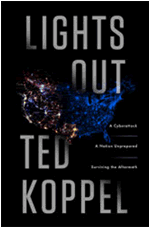


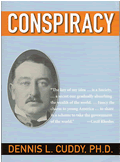
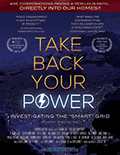





 Share This Article
Share This Article